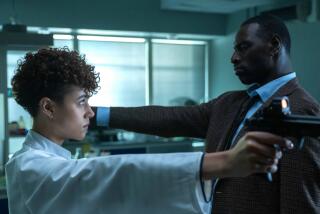SHOOTING STARS : ‘Dead Pool’s’ Kim Keeps Options Open
- Share via
Balance.
It’s a quality in which Evan Kim--co-starring as the newest of “Dirty” Harry Callahan’s
unfortunate partners in the recent “The Dead Pool”--is a true believer.
To begin with, Kim was trained as a tae kwon do martial artist in Korea and he balanced the skill with acting workshops.
Once the acting parts started rolling in, Kim also cultivated an ability to write scripts--and even to get them produced, more often than not.
Nothing was done to excess, however. It’s just that he liked to keep his options open--working on this career a while, then that one. But the changeability isn’t from professional Hollywood paranoia, Kim insisted. It’s merely from a restless spirit.
“Though you have to keep your eyes open in this business, any change should come from an internal desire, not from some temporary condition,” Kim said over a plate of linguine at a Marina del Rey eatery.
“And being a writer internalizes you, makes you stay within yourself,” he said. “It’s a good foil for being an actor that way.”
You can chalk up Kim’s strong sense of what works and what doesn’t to a 15-year career in the business. An early highlight, strangely enough, was his turn as Loo, the Bruce Lee wannabee, in the “Fistful of Yen” sketch in John Landis’ “Kentucky Fried Movie,” from 1977.
“It still works,” Kim said of the segment, easily the farcical film’s longest. He went on to explain, in no small detail, the difference between being an excellent martial artist in international competition and appearing to be one for the camera’s single eye.
(His jaw-dropping martial-arts fight scene in “The Dead Pool,” for example, was done in such a way as to use the camera’s lack of depth perception in Kim’s favor--filming him doing something that appears almost non-Newtonian, but which in fact was rather simple.)
Many of his other roles--in “Caveman” with Ringo Starr, “Go Tell the Spartans,” “Megaforce” and a co-starring role in “V” for television, among others--have called upon his athletic abilities, but not too many have been specifically Asian or Asian-American.
“There’s no escaping the fact that there’s a certain amount of (stereo-) typing going on; it always will,” said Kim, who was born in New Jersey to Korean parents. “But there’s also a lot less going on than people outside of the business think. And besides, the basic thing about being typed is that you can show what a good job you can do. That way, when the next non-specific role comes along, you’re in better shape for it.”
Kim says his twin adolescent desires--to write and to enter into the discipline of the martial arts--sprang from the same source: self-protection.
“I was one of your typical small, slow-to-grow kids,” said Kim with a grin. “I was getting beat up, fairly often, and also ignored in school, so I found I needed to channel my feelings of revenge and hurt into something constructive . . . useful for myself and others. Tae kwon do worked for becoming physically respected, and writing proved the means for periodically emptying the vessel.”
Writing still serves that purpose for Kim, even as the acting side of his career picks up--which it may do, after his powerful but witty turn as Eastwood’s partner in “The Dead Pool,” which has glommed more than $36 million at the box office so far. “But in a way, thinking that this role or that script might break it through for you is dangerous thinking; it builds up unreal expectations, you know? And it makes dealing with further rejection--always a major part of any performer’s career--more difficult.”
His wife and baby girl make the rejection easier to deal with, Kim said, but there’s always the uncertainty, the waiting and the misdirections to handle.
“That’s why I really try to keep on an even keel,” Kim said, making the “I’m crazy” finger motion at his head and laughing. “Really, that’s why staying in shape is valuable, why windsurfing and mountain climbing, playing outdoors in general, are all indispensable. What you have to do if you’re in this business--and want to stay--is keep moving. It keeps the perspective sharp.”
More to Read
Only good movies
Get the Indie Focus newsletter, Mark Olsen's weekly guide to the world of cinema.
You may occasionally receive promotional content from the Los Angeles Times.










